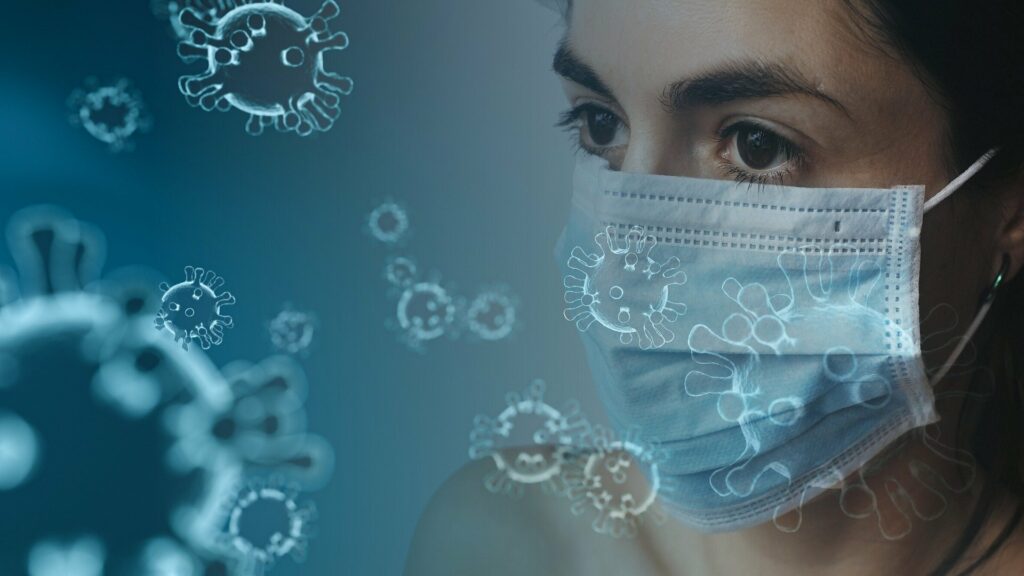Covid-19 is keeping the world on tenterhooks. We are experiencing a previously unimaginable situation. Everyone is part of the crisis. Every company is affected.
We would also like to shed light on this topic with various experts and provide you with valuable information and tips to help you through this crisis.
Our focus today: crisis intervention. How people are dealing with the coronavirus crisis and what they need to cope well.
Schools are closed, stores are emptied, events are canceled. A new awareness of hygiene is emerging. The coronavirus is challenging society. Everyone is part of this crisis. And everyone has to face up to the crisis. How we humans do this varies. Some react with concern, others take a structured and precautionary approach, others show their cynical side and still others panic.
But what does it take for people to cope well with the current restrictions and master this challenging situation in the best possible way? We asked Dr. Cornelia Martens, qualified psychological consultant, systemic business coach and management consultant, about this and more.
We are undoubtedly individual. No two people are the same. Nevertheless, there are common phenomena in crises like this. What are you observing in this current exceptional situation?
Cornelia Martens: Right now we can see how individual and different people are. And the reactions of individuals to the current exceptional situation are just as different.
On the one hand, there are those who still don't want to admit what it's all about. On the other side are the pessimists who are looking forward to the supposed "end times". What we all have in common is that we need clear structures in crises and want to understand things.
One thing is also clear: we humans are excellent at adapting to even the most adverse changes. Even if we may not appreciate change in principle.
What happens to people in a crisis?
Cornelia Martens: Of course, we are familiar from literature with typical reaction patterns to traumatic crises, such as a sudden death or other serious loss. However, I deliberately don't want to describe the current situation as a traumatic event. I think that would be counterproductive.
In my opinion, the piecemeal preparation of an entire nation for very drastic cuts to daily life has been extraordinarily successful. We can see this from the fact that a large majority of the population is supporting the restrictions in an amazingly constructive way. Fortunately, we are not traumatized.
Even if we are not traumatized, it is still a crisis caused by drastic restrictions.
What does it take for people to be able to cope well with restrictions and master challenging situations?
Cornelia Martens: I think it's again about asking: What do people need most in a situation like this, in which they are confronted with unpleasant restrictions?
First of all, as a human being, I want to understand what it's all about.
The ability to want to understand the connections in life is a deeply human characteristic. The more I understand, the less uncertain I am. It is therefore important to communicate clearly, transparently and openly so that those affected can develop an understanding of the situation. Of course, this doesn't mean that everyone has to understand everything down to the smallest detail. What is said must be plausible, comprehensible and credible.
People want to shape things, they want to be masters of their actions and not victims or pawns of circumstances.
We humans love to be able to shape our own lives. It gives us the feeling that a situation is manageable. "We can do it" is something we often hear. This is exactly the feeling we need.
We can now see this very clearly in the many private initiatives, from shopping for neighbors to volunteering. Michael Opriesnig, Secretary General of the ÖRK, illustrated this with a little story: a self-employed woman who was losing all her jobs due to the current situation contacted the Red Cross to volunteer.
We see numerous similar examples up and down the country, and the best thing about it is that we too can become active and shape things.
But what if we are no longer able to shape things due to external circumstances, for example because we are ill at home? In these cases, we still have the option of shaping our attitude to the situation. This is often much more difficult than actively tackling the situation. I think of my aunt, who has had COPD for years and is dependent on her oxygen tank and sits in a wheelchair. She hardly ever complains, despite the more than difficult living conditions - on the contrary, she takes each day with humor and an admirably positive attitude.
Viktor Frankl, founder of the third Viennese school of psychotherapy, said: "The last of human freedoms consists in the choice of one's attitude towards things."
People feel effective when they see a purpose. They want to do something that has meaning.
It makes sense to help the elderly neighbor who is ill and, for example, take them shopping. This also directs attention in a different and positive direction because it takes on a creative perspective. I do something that is good for the other person, that helps society, and this feeling reflects positively on me as the helper. And vice versa: the person being helped recognizes how nice and meaningful the helper's support is. By accepting the offer of help and being grateful, the helper gives the person being helped a good feeling again. All of this keeps us resilient even in times of restrictions.
Nevertheless, the stress levels within families are quite high: no contact with grandparents, schools and nurseries are closed and people have to work. These are burdens that demand a lot from people.
How do you see this and how can help be provided? Are there hotlines where you can get emotional support?
Cornelia Martens: I think that's a very important point. Even if, generally speaking, we can see that the measures are largely understood and supported by the population and that many people are actively helping others, there is also the other side of those people who are dependent on help and support. Those who are extremely burdened by their family situation or those who can no longer be visited.
In addition to the two corona hotlines (0800 555 621 - for general information and the hotline 1450 - in case of suspected illness), there are several public, free psychological hotlines from the telephone counseling service to Ö3's Kummernummer.
I think it would make sense to expand these hotlines in times of coronavirus. The demand is certainly there. We at the EAP Institute have psychological hotlines for our corporate clients and have seen an increase in calls in recent days. We have also noticed an increase in demand from companies that want to support their employees these days.
Digitalization is certainly a blessing in the current situation. WhatsApp, Skype and the like can be a door to the outside world now that we are supposed to avoid social contact. Even the older generation can be trained to a certain extent or are already users.
My parents, 80 and 82, are busy chatting with their friends, children and grandchildren in various WhatsApp groups. A friend in Munich, who is already spending two weeks in quarantine at home with her husband and young daughter, put it in a nutshell: How can we all get through this time unscathed? I already have "cabin fever"? I don't think we should forget the group of parents with children. We should come up with our own ideas to support them.
What can everyone do for themselves to get through this crisis in a mentally healthy way?
Cornelia Martens: It depends very much on your own circumstances. Am I working and a single parent or am I a resident of a retirement home and can't be visited? Am I self-employed as a small business owner who is currently worried about his or her economic survival and has to lay off employees, or am I a doctor in a hospital and have even more challenging working conditions than before? Do I have to fear for my job or do I have a chronic illness and belong to the risk group?
Ideally, I will be accompanied by a trained person in a personal crisis situation. This could be a therapist, a psychologist or a psychological counselor. However, this will not always be possible and sometimes not even wanted.
So the question is: what can I do myself when I am in a crisis situation to remain resilient and positive - despite adverse circumstances? Here are a few thoughts and suggestions:
Don't stay alone with your worries and fears.
Find someone close to you or someone you trust and express your thoughts. Or write them down. This can already be a first help.
If negative thoughts arise that cause anxiety, be aware of these thoughts and try not to judge them too much.
Try to acknowledge that you are having these thoughts and don't suppress them. Find something that relaxes you. This could be reading a good book or listening to music. Painting, sport, breathing exercises - they all belong here.
Create a "What's good for me list".
Write 10 points on this list that are good for you and that you can implement well in the current situation. Write these points down quickly and think about which of the points you would like to do today. Choose at least one of the points every day and do what is good for you.
Slow down and find your own method: there are countless other methods - and I'm talking about helping yourself in difficult times - that everyone has to find for themselves first. From meditation (there are wonderful apps such as Headspace or Calm) and breathing exercises to light sporting activity and sweat-inducing workouts. The spectrum also ranges from free online courses to writing a diary. Once again, what is good for me is not necessarily good for you. We are all different.
And if at all possible: don't lose your sense of humor!
How can companies alleviate/positively influence the mental stress of their employees?
Cornelia Martens: The same applies to companies as I said about dealing with challenging situations in general: It is important to act in a "human-oriented" way (keyword: what do we humans generally need in order to cope well with crisis or difficult situations) and in a humane way (this includes respect and appreciation).
Many companies have now recognized how essential it is to see people as "multidimensional beings": Body-mind and psyche. For a long time, the mental dimension was completely banished from everyday working life - as if working people only came to work with their bodies and left their minds at home.
Since burnout and the associated sick leave, it can no longer be denied: The psyche can also become "sick" and sick leave for psychological reasons lasts longer than a simple cold. For this reason, many of the companies we count among our clients offer an EAP (employee assistance program) as a preventative measure - in addition to various sports activities or social events within the company - where their employees can take advantage of anonymous and free coaching and counselling.
"The question is wrong when we ask about the meaning of life. It is life that asks questions."
(Viktor E. Frankl)
With this in mind, let's find good answers to the question we have just asked!
Conclusion: This helps people in a crisis
In any crisis - or currently in a very challenging time with the coronavirus - it is important for people to communicate clearly, transparently and openly so that all those affected can develop an understanding of the situation.
This provides security, because people want to be able to shape their own lives and this gives them the feeling that a situation is manageable, even in times of crisis. And even if not all situations can always be overcome, it is always possible to shape your own attitude to the situation.
Source: Great Place To Work® Institute, 17.03.2020 by Anna Mahayni and Dr. Cornelia Martens; https://www.greatplacetowork.at/blog/coronavirus-gesellschaft
Many companies offer their employees anonymous and free coaching and counseling as part of an eap (employee assistance program) program. Contact us and promote the mental and physical health of your employees!


